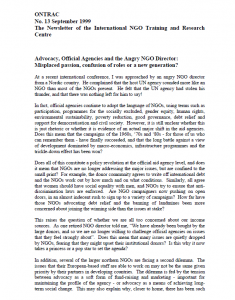 Official agencies continue to adopt the language of NGOs, using terms such as participation, programmes for the socially excluded, gender equity, human rights, environmental sustainability, poverty reduction, good governance, debt relief and support for democratisation and civil society. However, it is still unclear whether this is just rhetoric or whether it is evidence of an actual major shift in the aid agencies. Does this mean that the campaigns of the 1960s, ‘70s and ‘80s – for those of us who can remember them – have finally succeeded, and that the long battle against a view of development dominated by macro-economics, infrastructure programmes and the trickle-down effect has been won?
Official agencies continue to adopt the language of NGOs, using terms such as participation, programmes for the socially excluded, gender equity, human rights, environmental sustainability, poverty reduction, good governance, debt relief and support for democratisation and civil society. However, it is still unclear whether this is just rhetoric or whether it is evidence of an actual major shift in the aid agencies. Does this mean that the campaigns of the 1960s, ‘70s and ‘80s – for those of us who can remember them – have finally succeeded, and that the long battle against a view of development dominated by macro-economics, infrastructure programmes and the trickle-down effect has been won?
Over the next few years INTRAC will be looking at these and other related questions. We will be identifying the different pressures that are affecting the changing roles and relationships between the main actors in development. We would like to find out whether many of the battles of the past have indeed been won. In this case, the level of interaction between governmental and non-governmental organisations will rightly move from confrontation to collaboration.
This issue also looks at the theme of leaderhip and change in NGOs, exploring the need for a personalised approach to change. Liz Goold gives an update on work in Nigeria as part of the Capacity Building for Decentralised Development Project and Theresa Mellon writes about an Education, Training and Support Programme for NGO Workers in Central Asia.
Download:
ONTRAC 13. Advocacy, Official Agencies and the angry NGO Director: misplaced passion, confusion of roles or a new generation?
.pdf (0.07mb)